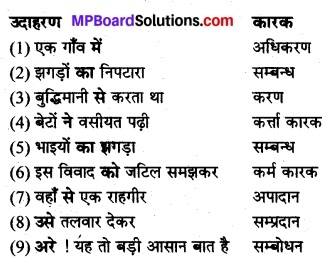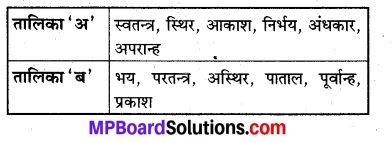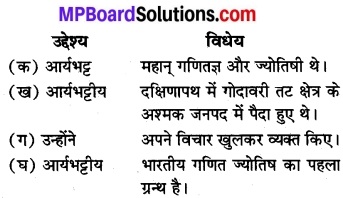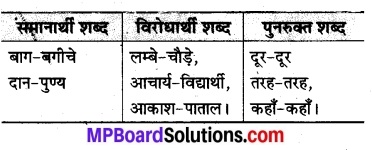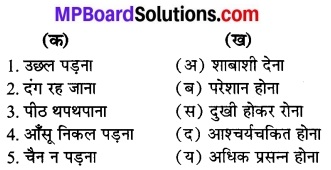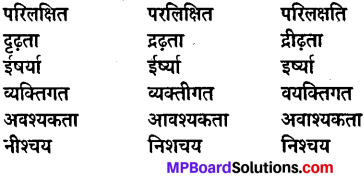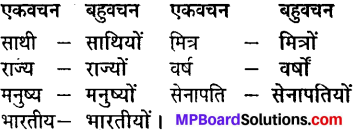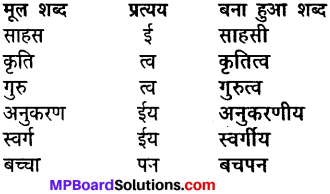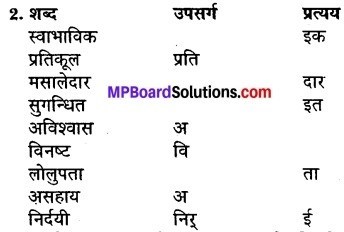MP Board Solutions for 12th English Chapter 3 Goodbye Party for Miss Pushpa T.S. Questions and Answers aids you to prepare all the topics in it effectively. You need not worry about the accuracy of the Madhya Pradesh Board Solutions for 12th English as they are given adhering to the latest exam pattern and syllabus guidelines.
You Can Download MP Board Class 12th English Solutions Questions and Answers Notes, Summary, Lessons: Pronunciation, Translation, Word Meanings, Textual Exercises. Enhance your subject knowledge by preparing from the Chapterwise MP Board Solutions for 12th English and clarify your doubts on the corresponding topics.
MP Board Class 12th English A Voyage Solutions Chapter 3 Goodbye Party for Miss Pushpa T.S. (By Nissim Ezekiel)
Kick start your preparation by using our online resource MP Board Solutions for 12th English Chapter 3 Goodbye Party for Miss Pushpa T.S. Questions and Answers. You can even download the Madhya Pradesh Board Class 12th English Solutions Questions and Answers for free of cost through the direct links available on our page. Clear your queries and understand the concept behind them in a simple manner. Simply tap on the concept you wish to prepare in the chapter and go through it.
Goodbye Party for Miss Pushpa T.S. Textbook Exercises
Word Power
A. Choose the words from the text, which are opposite in meaning to the words given here and use them in the sentences of your own:
(i) foe, (ii) native, (iii) arrive, (iv) bitterness, (v) forget, (vi) infamous, (vii) unpopular.
Answer:
(i) Foe—friend—A wise foe is better than a foolish friend.
(ii) Native—foreign—Many students prefer to go to foreign countries for higher studies.
(iii) Arrive—depart—Tomorrow he will depart for U.K.
(iv) Bitterness—sweetness—There is always a smile of sweetness over her face.
(v) Forget—remember—I don’t wish to remember that unhappy incident.
(vi) Infamous—renowned—My uncle was a renowned cardiologist.
(vii) Unpopular—popular—It is a line from a very popular song of Mukesh.
B. Mark the use of the French phrase ‘bon voyage’ for wishing happy journey. There are several French and Latin words and phrases, which are commonly used in English. For example,
Answer:
- deja vu
- tete-a-tete
- avant garde,
- numero uno
- ab initio
- status quo
- lingua franca.
Look up a dictionary and find out their meanings:
- deja vu—the feeling that you have previously experienced something which is happening to you now.
- tete-a-tete—a private conversation.
- avant garde—new and very modem ideas in art, music or literature.
- numero uno—a grand occasion
- ab initio—starting from the beginning.
- status quo—to maintain the previous status.
- Lingua franca—a language of communication used along with one’s mother tongue.
C. In the poem, there are some distinctive features of Indian English that the poet parodies.
Answer:
- The use of the progressive (-ing) form for verbs of perception which are not used in the progressive infinite verb phrases in British standard English, e.g.
‘You are all knowing’.
‘She is feeling’, ‘I am always appreciating.’
(For detailed study of such verbs, you may refer to the grammar segment of the lesson,
‘Netaji Subhash Chandra Bose’) - Omission of articles, e.g. (a) very high family, (b) renowned advocate, (the) summing up.
- Use and positioning of adverbs at inappropriate places, e.g. ‘only external sweetness’,
‘now which place’, ‘with men also and ladies also’.
Look for other features of Indian English in the poem, which mark a departure from the Standard English.
Ans.
The poem is free verse. There is neither rhyme scheme nor traditional metrical pattern. It has no regular recurring rhythm. Here, the placing of stress is rhetorical on the meaning of the lines. Therefore, the number of syllables is not relevant.
Comprehension
A. Answer in one sentence each:
Goodbye Party For Miss Pushpa T.S. Questions Answers MP Board Question 1.
What has the party been arranged for?
Answer:
The party has been arranged for the farewell of Miss Pushpa.
Goodbye Party For Miss Pushpa Ts Questions Answers MP Board Question 2.
Who is going to a foreign country?
Answer:
Miss Pushpa, sister of the poet, is going to a foreign country.
Goodbye Party For Miss Pushpa Question Answer MP Board Question 3.
Whose wife cooked nicely?
Answer:
The wife of poet’s uncle’s old friend cooked nicely.
Goodbye Party For Miss Pushpa T.S. Poem Question Answers MP Board Question 4.
Why has Surat been mentioned in the poem?
Answer:
Surat has been mentioned in the poem because the poet is confused about the place Pushpa’s father belonged to and also the poet remembers his stay at Surat once.
B. Answer in about 60 words each:
Goodbye Party For Miss Pushpa Ts Poem Question Answers MP Board Question 1.
What qualities of Miss Pushpa T.S. are evident from the speaker’s address?
Answer:
Miss Puspha T.S. is a sweet lady with an all time smile on her face. She smiles even without reason. She belongs to a reputed family and is very popular among people. She is full of spirits. She never says ‘no’ to ‘things’. She is always ready to do anything. She has ambitions and is prosperous. These are the qualities evident from the speaker’s address.
Goodbye Party For Miss Pushpa Ts MP Board Class 12th Question 2.
What was Miss Puspha T.S. popular with?
Answer:
Miss Pushpa is popular with men and women. As, she is always smiling and full of spirits, everyone likes her. She never says ‘no’ to anyone for anything. Her good spirit makes her popular.
Goodbye Party For Miss Pushpa T.S. Questions Answers Pdf MP Board Question 3.
What does the speaker mention about Miss Pushpa doing in the end?
Answer:
The speaker is addressing the audience. He tells the people that the party has been arranged to wish for a happy journey to Miss Pushpa T.S. who is leaving for improving her prospect by going abroad.
Goodbye Party For Miss Pushpa Ts Summary In Hindi MP Board Question 4.
In what ways does Miss Pushpa show her good spirit? (M.P. Board 2016)
Answer:
Miss Pushpa is a lady with certain distinctive traits. She is full of spirits. Whenever the poet asks her to do anything, she readily replies ‘Just only I will do it’. She never says no .
Question 5.
What inspires laughter in the poem?
Answer:
The poet creates humour in his poem through his description of Miss Pushpa. He mentions that Miss Pushpa is sweet not only externally but also internally. She smiles and similes without reason. Also the act of forgetting creates a little humourous situation where the poet confuses between the names of cities. Also with a mention of a city’ the way poet remembers his visit to Surat not only shifts the main focus from Miss Pushpa to poet but also generates a similes on facts of how the poet has brought some trivial instance into discussion.
C. Answer in about 75 words each:
Question 1.
What features of ‘Babu English’ are suggested in the poem? Give illustrations.
Answer:
‘Babu English’ is the term used for the language which an educated Indian speaks or writes. It is the type of English which doesn’t follow the strict rule of the original English. It gives stress on the expression of meaning. It is the mixed English called Indianised version of English now known as GIE (General Indian English). In the poem, we see there is no set pattern. It is written in free verse Without any rhyme and rhythm. It is in a formal talk manner. Still it conveys its meaning very clearly.
Question 2.
Give the central idea of the poem.
Answer:
The central idea of the poem is to highlight the character of Miss Pushpa T.S. She is leaving for abroad. She is going there to improve her prospect. She is a charming lady with an all smiling face. She smiles even without reason. She smiles for she feels it. She is very popular among people and is always ready to.do anything for everyone. She never says ‘no’ to anyone. She is full of spirits. The poet appreciates her spirit, readiness, and pleasing smiles. The main theme is to highlight her qualities.
Speaking Activity
A. Read aloud the parts of the poem in groups, observing the stress-pattern. (Consult an English Pronunciation Dictionary)
Answer:
Do yourself with the help of your teacher.
B. Deliver a short speech on the topic:’A sense of humour enlivens life.’
Answer:
Life is full of ifs and buts. So, everyone has some kind of stress in life. However, some have to go through severe strains. Those who are the victims of such strains, they live in tension. Diseases occupy them. Humour is said to be the greatest relief. It is a good exercise. It works as a prevention to many diseases. It keeps one calm. One feels relaxed. It purifies our mind. A sense of humour enlivens life. So, we should keep laughing. It works as a medicine and show wonders.
Writing Activity
A. There is a great deal of humour associated with human habit of forgetting. Did it happen with you or any of your friends? Narrate the event in one paragraph.
Answer:
The habit of forgetting sometimes creates a very humorous situation. Once I had to face such a situation. I was going to attend the marriage ceremony of my friend and decided to gift him a pair of shoes. I bought the shoes from the showroom and got it packed. But when I reached my friend’s house and gave the packet to my friend, it was found that I there was a pair of lady slippers in the packet. I had forgotten the shoes in the showroom and took another packet containing the slippers. It was a very humorous situation.
B. Write a letter to your friend, highlighting the importance of humour in the hurly-burly of modern- day life.
Answer:
Write it yourself. Take help from the answer of Speaking Activity B.
Think It Over
A. Have you heard, or read the exploits of such immortal characters as Tenali Ram,
Mulla Nasiruddin, or Birbal? What do they have in common? Think of their contribution to [ their times].
Answer:
Yes, I have read the exploits of the immortal characters like Tenali Ram, Mulla Nasiruddin and Birbal. They had one thing common in themselves. They all lived their life in humour and gaiety. They enjoyed laughing themselves and made the world laugh with them. They were wise and taught the world the art of living. Until today, we enjoy their tales and get inspired to live happily and with full of humour.
B. There are many humorous characters in the plays of William Shakespeare such as Falstaff and I Touchstone. They reveal a unique insight into human psychology and philosophy of life as well. Think of how humour makes us philosophical?
Answer:
No doubt. Humour makes us philosophical sometimes. There are many comic characters I in Shakespeare’s plays who become highly philosophical in their songs and speech. They I reveal great secrets of life. They also unveil the realities of our fate and destination. Therefore, the purpose of humour becomes great. The humour behind a particular act makes us look at it differently. While finding humour in continuous fall of ant make us realise the philosophy of life where humans fail many times while trying something.
Thing’s to Do
A.Go through the following lines taken from ‘Mac Flecknoe’ by John Dryden, an 18th century neo-classical satirist who used humour to great effect in his satire:
All mortal things are subject to decay.
And, when fate summons, monarchs must obey
This Flecknoe, who, like Augustus, young
Was called to empire, and had governed long:
In prose and verse was owned without dispute,
Through all the realms of nonsense, absolute.
Humour, wit and irony are the three essential ingredients of a satire. Consider them with respect to the above lines.
Answer:
Consult your teacher and study these things in his guidance.
B. ‘Humour’ was a medical term in the 16th and 17th centuries. Ben Jonson, the great 17th century . Elizabethan dramatist used this concept for the telling effect in his comedy of humour plays like
Volpone, Every Man in his Humour, and so on. Prepare a list of his plays and examine the . concept of humour as used in them.
Answer:
Do yourself.
C. There is an interesting character named Mrs. Malaprop in the anti-sentimental comedy, The Rivals, of the 18th century playwright, R.B. Sheridan. ‘Malapropism’ is a term derived from her because of her amusing and humorous candour, in using the similar-sounding words with a confusion of meaning. Go through the play and prepare a list of such words.
Answer:
Do yourself.
Goodbye Party for Miss Pushpa T.S by Nissim Ezekiel Introduction
This is a humorous poem which contains 42 fines. It describes certain qualities of the poet’s sister. Miss ‘ Pushpa T.S.. who is departing for foreign in two-three days for improving her prospect.
Goodbye Party for Miss Pushpa T.S Summary in English
Addressing to his friends, the poet says that their dear sister is departing for foreign in two- three days. They are arranging a party for her happy journey. Miss Pushpa is a sweet lady with all smiling not only externally but also internally. She smiles and smiles even if there is no reason for it. She smiles only because she feels, she should smile. She belongs to a very high family. Her father was a renowned advocate in Bulsar or Surat. The poet doesn’t remember exactly. The poet refers to Surat for he has another memory about that place when once he had stayed with his uncle’s old friend whose wife cooked nicely.
Pushpa is popular among people. Whenever the poet asks her for anything she readily answers “just now only I will do it”. It shows her spirit. The poet always appreciates her good spirit. Pushpa never says ‘no’ to anything. As, she is leaving now for improving her prospect, the poet wishes all his best for her happy journey. Then, the poet invites the other speakers to sum up the farewell party.
Goodbye Party for Miss Pushpa T.S Summary in Hindi
अपने मित्रों का उद्बोधन करते हुए कवि कहता है कि उनकी प्यारी बहन दो-तीन दिनों में विदेश जा रही है। वे उसकी शुभ यात्रा की कामना के लिए एक समारोह आयोजित कर रहे हैं। – सुश्री पुष्पा हर क्षण मुस्कान बिखेरने वाली एक मधुर महिला है-न केवल बाहर से बल्कि आन्तरिक रूप से भी। वह मुस्कुराती रहती है, भले ही कोई कारण न भी हो तो। वह मुस्कुराती है सिर्फ इसलिए कि उसे लगता है कि उसे मुस्कुराना चाहिए। वह एक उच्च वर्गीय परिवार से है। उसके पिता बल्सर या सूरत के प्रसिद्ध वकील थे। कवि को ठीक-ठीक याद नहीं है। शायद सूरत क्योंकि कवि के दिमाग में वहाँ की एक अन्य घटना भी याद है जब एक बार वह वहाँ अपने चाचा के एक पुराने मित्र के साथ ठहरा था जिनकी पत्नी अच्छा खाना बनाती थी।
पुष्पा लोगों में काफी लोकप्रिय थी। जब भी कवि उसे कुछ करने को कहता, वह तपाक से जवाब देती, “लो अभी करती हूँ।” इससे उसका उत्साह झलकता है। कवि हमेशा उसके अच्छे उत्साह की तारीफ़ करता है। पुष्पा कभी भी किसी चीज के लिए ‘ना’ नहीं कहती। अब चूँकि वह अपनी सम्भावनाओं के विकास के लिए विदेश जा रही है, कवि उसकी सुखद यात्रा की कामना करता है। उसके बाद कवि अन्य वक्ताओं को उस विदाई समारोह के समापन के लिस, आग्रह करता है।
Goodbye Party for Miss Pushpa T.S Word Meaning


Important Pronunciation

Goodbye Party for Miss Pushpa T.S Stanzas for Comprehension
Read the following stanzas carefully and answer the questions that follow them:
1. Friends,
Our dear sister ,
is departing for foreign
in two-three days,
and
we are meeting today
to wish her bon voyage. (Page 17)
Question:
(i) Whom does the first line refer to?
(ii) …………….. is departing for foreign.
(iii) Find a word which means same as ‘happy journey’?
(iv) Why are they meeting there?
Answers:
(i) The audience or the friends of the poet are referred to in the first line.
(ii) The poet’s sister.
(iii) Bon voyage has a same meaning as ‘happy journey’.
(iv) They are meeting there to wish for a happy journey to his sister Miss Pushpa.
2. Miss Pushpa is coming
from very high family.
Her father was renowned advocate
in Bulsar or Surat,
I am not remembering now which place. (Page 18)
Questions:
(i) Who belongs to a very high family?
(ii) What does the last line refer to?
(iii) Find a word from the above stanza which is opposite in meaning to ‘infamous’?
(iv) Who was a renowned advocate?
Answers:
(i) Miss Pushpa belongs to a very high family.
(ii) The last line refers that the poet exactly doesn’t remember to which place Miss Pushpa’s father belongs.
(iii) ‘Renowned’has a opposite meaning to’infamous’.
(iv) Miss Pushpa’s father was a renowned advocate.
3. Whatever I or anybody is asking .
She is always saying yes,
And today she is going to improve her prospect
and we are wishing her bon voyage. (Page 18)
Questions:
(i) Find a word from the above stanza which is simlar in meaning to ‘develop’.
(ii) The audience is meeting to wish her.
(iii)What does she say when anyone asks her for anything?
(iv) Why is she going to foreign?
Answers:
(i) Improve has similar meaning to ‘develop’.
(ii) Bon voyage.
(iii) She always says ‘yes’ when anyone asks her for anything.
(iv) She is going to foreign to improve her prospect.
We believe the information shared regarding MP Board Solutions for 12th English Chapter 3 Goodbye Party for Miss Pushpa T.S. Questions and Answers as far as our knowledge is concerned is true and reliable. In case of any queries or suggestions do leave us your feedback and our team will guide you at the soonest possibility. Bookmark our site to avail latest updates on several state board Solutions at your fingertips.
